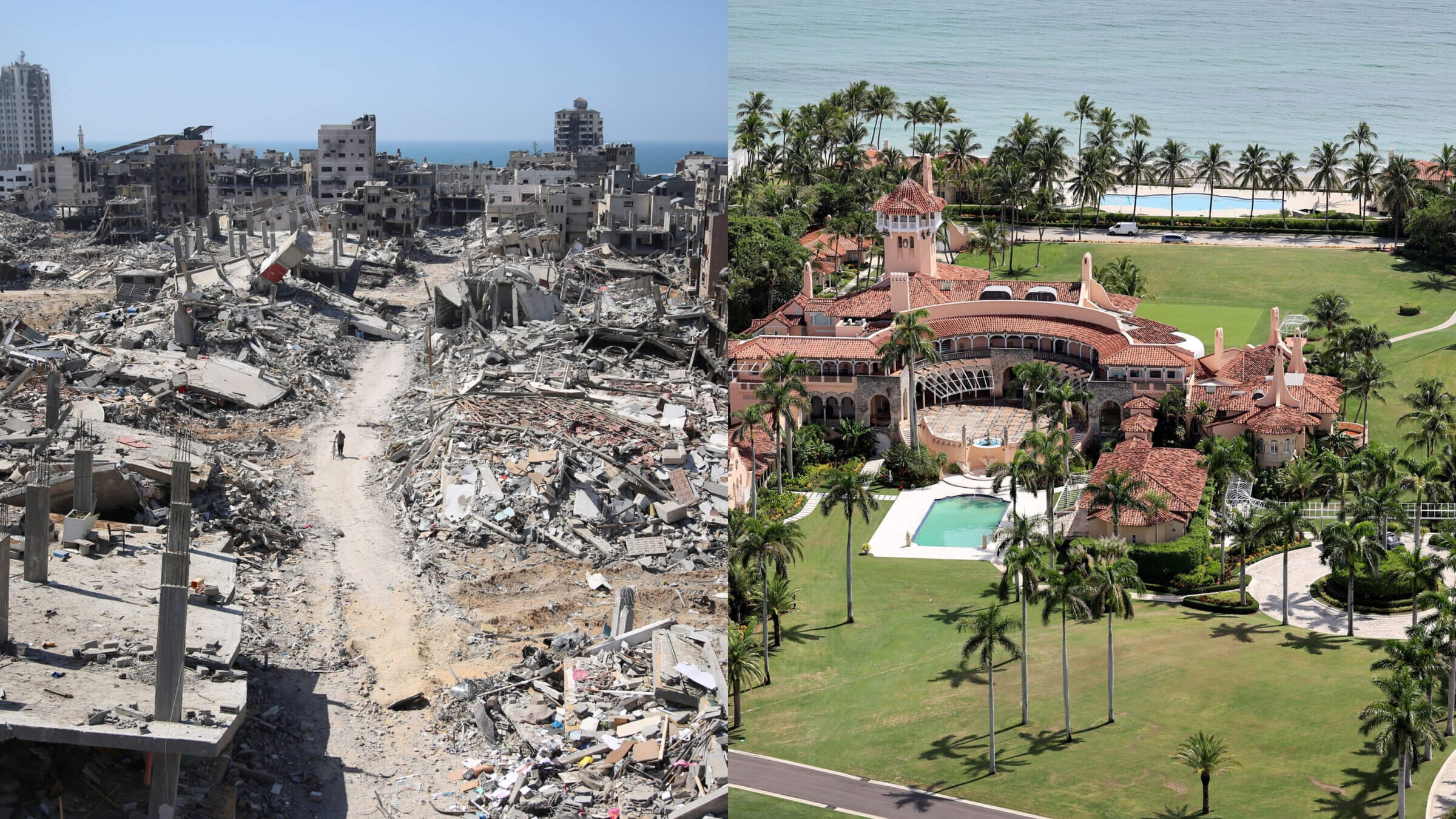Take Trump’s Gaza-a-Lago plan seriously, not literally
Forget all the reasons turning the Palestinian enclave into the “Riviera of the Middle East” seem impossible (and illegal). It’s what underlies the president’s wacko proposal that matters.

Will a devastated Gaza City (left), soon be transformed into something opulent akin to Mar-a-Lago (right)? No. But that’s not the point. Photo by AFP via Getty Images and Joe Radele/Getty Images / Canva
This is an adaptation of our editor-in-chief’s weekly newsletter. Sign up to get it delivered to your inbox on Friday afternoons.
There are a million reasons that we should not be taking President Donald Trump literally when he talks about the United States taking over the Gaza Strip and turning it into the “Riviera of the Middle East.” Two million, actually — for each of the Gaza residents whose forced displacement would be a war crime under international law. It’s seems unlikely that Trump has actually spoken to a single Palestinian about what home means to them or what they hope for their future.
Billions of reasons, really, not to take literally a plan that would cost billions of dollars from a man hellbent on eviscerating U.S. foreign aid. Thousands more for the thousands of American troops the isolationist MAGA movement would never approve of sending to Gaza.
And, perhaps most importantly, 79 reasons we desperately need Hamas not to take the president literally, one for each of the 79 hostages still in Gaza — some corpses; many living, breathing, suffering Israeli human beings.
None of which means we can dismiss the harebrained scheme. As we all should have learned years ago, we must take Trump seriously, not literally; that’s what his supporters generally do. So I’ve spent the past few days wrestling with what taking Gaza-a-Lago seriously looks like for the Middle East and for American Jews.
Origins of the framework
It was a few months before the 2016 election that a Republican strategist named Brad Todd and a campaign-trail reporter named Salena Zito coined the concept that the fundamental disconnect between media elites and Trump voters was that reporters took him literally but not seriously and the voters did the inverse.
The pair, co-authors of the 2018 book The Great Revolt: Inside the Populist Coalition Reshaping America’s Politics, argue that frenzied fact-checking Trump’s literal words often make us miss the serious sentiments or big ideas behind them.
The billionaire Trump-endorser Peter Thiel invoked the same idea in a speech at the National Press Club, saying that when voters hear Trump talk about banning travel from Muslim-majority countries or making Mexico pay to build a wall along its border with the U.S., “What they hear is we’re going to have a saner, more sensible immigration policy.” The Columbia Journalism Review published a 2020 piece exploring how the seriously vs. literally framework played out over Trump’s first term, and smart people have continued to apply it to Trump 2.0 proposals to buy Greenland, take over the Panama Canal, make Canada the 51st state and, yes, gentrify Gaza.
Taking Trump’s impossible Gaza dream seriously not literally does not mean seeing it as a well-planned strategic gambit that reflects deep diplomatic thinking; it’s clear there was virtually no substantive discussion of the wild idea before the president proffered it at a White House news conference with Israel’s Prime Minister Benyamin Netanyahu. Taking it seriously not literally means ignoring the specifics of what he said in hopes of gleaning insights into how he thinks.
Three serious takeaways from Trump’s plan
The first and clearest signal is about paradigm shift. As others have said, Trump is not just thinking outside the box, but throwing out the box, blowing it up. This could, actually, be good for all involved.
Trump is telling us that he looks at the decades of stalemate and cyclical violence, at the Republican and Democratic administrations who have promoted basically the same policies, at the generations of Middle East experts who broadly agree on parameters for peace but make no progress towards it — and he calls foul. He’s saying he doesn’t want to hear the same old story of what won’t work, he wants to actually write a new chapter. Taking him seriously, then, means he wants to hear other unboxed ideas that would have been rejected outright by any previous leader. And when people pitch them, we should not take them too literally, either.
The second “serious” thing I see is the normalization of fringe ideas and influencers. The two main people embracing the “Riviera” literally are Bezalel Smotrich, Israel’s far-right finance minister, and Mort Klein, the longtime leader of the Zionist Organization of America, who has for years been a thorn in the side of the American Jewish establishment and has been sued for racism, sexual harassment and an “ego-driven jihad” by his own staff and board members. This one is scary; a Middle East shaped by extremists like Klein and Smotrich is not going to be peaceful.

My third “taking it seriously” takeaway is that Trump — and, probably, most of his supporters — has zero understanding of the yearnings, cultural histories, narratives, identities, norms or needs of actual Palestinians or, for that matter, Jewish Israelis. He seems to have neither sacred cows nor a north star for the Middle East, neither clear boundaries nor a fixed goal.
Sure, this president, like many before him, would like to win the Nobel Peace Prize. He dreams of doing the mother of all deals with the Saudis, and would likely sacrifice any number of things along the way. Does Trump actually care deeply about Israel being a Jewish homeland? About it remaining a democracy? About Palestinian national aspirations?
Nope, nope and nope. He cares about winning, and he’s always happy to change the rules of the game.
Some serious experts weigh in
To help me parse the serious-not-literal meaning of the Gaza plan, I called up two true experts who sit in different places on the political spectrum and always have sharp insights: Daniel Shapiro, who served as U.S. ambassador to Israel during the Obama Administration, and Michael Oren, who was his counterpart, Israel’s ambassador to Washington, from 2009 to 2013.
Both first went to the tactical. Oren said Trump was “creating a ladder” for various hostile parties “to climb down.”
“He can say to the Saudis, ‘OK, I won’t invade the Gaza Strip but you’ve got to give up your demand for Palestinian statehood,’” explained Oren, who went on to serve as a minister in Netanyahu’s government and hosted Trump during his 2017 visit to the region. “He can say to Hamas, ‘OK, I won’t relocate all of Gaza’s people but you’ve got to give up control of the territory.’”
Shapiro, who until Trump’s inauguration was deputy assistant defense secretary for the Middle East, used the same metaphor for a different constituency.
“It is correct that a lot of the old ideas have failed and don’t seem to be going anywhere, and that repeating ideas that have failed and aren’t going anywhere doesn’t make sense.”Daniel ShapiroFormer U.S. ambassador to Israel
“At the simplest and most utilitarian and shortest-term level, it might create a ladder for Netanyahu and his coalition to go to Phase Two of the agreement,” Shapiro said, referring to the precarious Israel-Hamas ceasefire and hostage-release deal. “Tell Smotrich, ‘You can’t say no to Trump because he’s giving us this golden opportunity.’ Maybe he bought them some space by putting out this cockamamie proposal.”
Smart points all, but I pushed them to go deeper on “seriously.” Again they said much the same thing, if in different ways: That Trump’s blow-up-the-box approach is actually on point, because the box — the two-state solution — has proven empty.
“It is correct that a lot of the old ideas have failed and don’t seem to be going anywhere, and that repeating ideas that have failed and aren’t going anywhere doesn’t make sense,” Shapiro told me.
“If you’re trying to be disruptive and generate new ideas, and get some of the Arabs to come forward with ideas,” he added, maybe throwing out something outlandish can help. “Just rip the cover off and look at the whole thing differently than they have before.”
And here’s Oren: “The nostrums for these last 30 years — two-state solution, we have to nurse Palestinian statehood — is not what he’s about. They haven’t worked; don’t get me started, they haven’t worked.
“I think what we can say is that he’s serious about changing the discourse,” Oren added. “He has changed the discourse.”
The problem with the seriously not literally framework, both of these veteran diplomats warned, is that it’s not just about how journalists or members of the American public regard Trump’s statements. It’s about how Hamas, for example, takes them.
“He has changed the discourse.”Michael OrenFormer Israel ambassador to Washington
The risk of putting out “this cockamamie proposal,” Shapiro said, is that it makes Hamas “pull out” of the ceasefire deal — or, worse yet, “puts targets on the backs” of American private security officers currently on the ground in Gaza helping screen Palestinians for weapons as they return to their destroyed homes.
For Oren, “the problem with the Trump plan is not getting America involved in rebuilding Gaza” or even the prospect of relocating the Palestinians.
“The big problem is Hamas — Hamas still has the guns and the hostages,” Oren said, adding that hostage families “were very, very upset” by Trump’s surprise announcement. “What are you going to do about the guns when they’re holding the hostages?”
He’s asking literally — and seriously.















